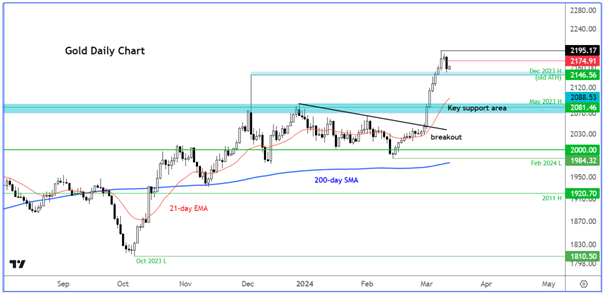Marvell shares spike amid report SoftBank explored possible takeover
Gold and silver were looking to bounce back following the CPI-related drop on Tuesday, in a relatively quieter day for data and with the Fed in the blackout period ahead of next week’s FOMC meeting.
Following last week’s sharp gains to repeated all-time highs, gold investors were not in a hurry to pile in and push the metal further higher at the start of this week.
There was always the possibility of a rebound in bond yields and the dollar, given the importance of inflation data and following a mixed jobs report on Friday.
As it turned out, today’s CPI report was hotter than expected on both the headline and core fronts, which triggered a quick rally in the dollar and a sell-off in government bonds.
As yields rose, the opportunity cost of holding gold increased, and so did the selling pressure. Still, the weakness was not too significant in the grand scheme of things, with the metal shedding some $25 worth of gains.
Even if gold were to weaken more in the short term, this wouldn’t necessarily be a sign that the metal has topped.
Many investors who missed the opportunity to buy gold when it started to rally last month will be waiting to pick up short-term dips. So, more gains could well be on the way soon.
Dollar Fails to Find Too Much Love From Hot CPI
Federal Reserve Chair Jerome Powell's sunny take on inflation is still music to traders' ears, even though the core CPI nudged up by 0.4% in February, a smidge higher than expected.
But the market's reaction? Not quite as wild as before when faced with similar surprises in inflation. It looks like traders are still hanging onto Powell's less-than-hawkish vibe, which has everyone thinking about potential rate cuts in June and keeping the market response in check.
In the rates futures market, there has only been a slight adjustment downwards since the week began, suggesting the expectation of easing hasn’t changed much despite the stronger inflation data.
Right now, traders are penciling in 19 basis points for the June rate decision and 85 basis points by December. Even though payrolls and inflation were a bit perkier than forecast, the market didn't bat an eyelid much.
It seems like the market's feeling pretty steady, all thanks to Powell's laid-back stance.
Unless there's a big shake-up in risk-taking by the end of the week, gold could head back towards last week’s record highs.
In case you missed it on Tuesday, at 3.2%, headline CPI accelerated against expectations from 3.1% recorded in the month before. Core CPI was expected to ease to 3.7%, but it came in at 3.8%, albeit a touch lower from the previous print of 3.9%.
Still, this was the third month of above-forecast inflation, with prices of basic necessities like car insurance, transportation, and hospital services all rising noticeably.
Looking ahead, we have more inflation data coming up later in the week, with PPI on Thursday and UoM Inflation Expectations survey on Friday.
But CPI was the main data highlight this week, and it didn’t disappoint those who were calling for a stronger print. However, the reaction was less than what the dollar bulls would have liked to see.
Can Gold Regain Poise After CPI-Related Drop?
Well, stock market investors have certainly shrugged off the strong CPI print, so why can’t gold investors? Either that or stock markets are under-pricing the risks of inflation, which remain sticky for even longer.
So, there is a chance that we may see gold and silver stage a comeback moving forward.
As mentioned, the stronger and sticky inflation data caused gold to weaken, but US equity markets managed to rebound as technology stocks rallied.
Investors are clearly still expecting the Federal Reserve to cut interest rates this year, with the odds of a June trim being around 70%.
With the market remaining confident of a rate cut in June, despite a slightly stronger CPI report, gold’s weakness should be short-lived.
Gold Technical Analysis and Trade Ideas

Source: TradingView.com
Looking at the gold chart, it was only on Friday when the metal reached a fresh record high, so there is no reason to be extremely bearish just because of a slightly above-forecast inflation print.
While there is the potential for gold to weaken a bit more, key short-term support is now not too far, around $2146, which was the high made back in December.
On an intraday basis, $2150 is also a key level, so there is a possibility it may not even reach $2146 before pushing higher again.
Regardless, below these levels, there are even stronger support levels to watch in case we get a deeper pullback.
For example, $2100 is the next round level to watch, followed by long-term support, around the $2081/88 area, which was once strong resistance on multiple occasions in the past few years.
Therefore, even if gold were to weaken more in the short term, this wouldn’t necessarily be a sign that gold has topped.
Many investors who missed the opportunity to buy gold when it started to rally last month will be waiting to pick up short-term dips.
